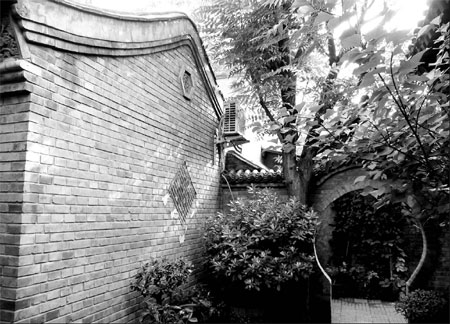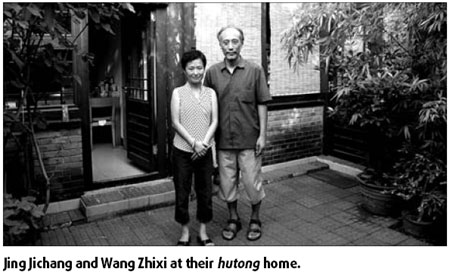
The couple Jing Jichang and Wang Zhixi's traditional courtyard house is an attractive homestay for overseas visitors. Photos by Xie Fang
The quiet Dajinsi Hutong is a few minutes' walk from the stylish bars at Houhai Lake in central Beijing. The elegant screen wall, delicate brick carvings and lush trees tempt travelers to reach for the bell.
Thin and of average height, Jing Jichang opens the door with a warm smile. Rather than guiding guests straight into the house, the 53-year-old starts by discussing the origins of the front wall, while his wife Wang Zhixi leads a Japanese tourist into the yard, all the while speaking fluent Japanese.
Their courtyard home has been chosen as one of nearly 600 homestays in Beijing for overseas visitors during the Olympics, and three of the four rooms have been booked out from August 5 to 15. Unlike many hotels, which have doubled their rents, Jing and Wang have kept their original prices - 400 yuan ($58.8) per night per guest, including breakfast.
Having a meal in a hutong house is very attractive to many tourists and Wang is happy to put her cooking skills to good use. But she is worried about which jiaozi (Chinese dumplings) to make, since her diners might be different each day and she cooks them for every dinner. Jing and Wang have eaten more than enough dumplings over the years and so has their dog, which runs away as soon as it sees them.
"Apart from that, it's great fun having foreign guests staying with us," says Wang.
Jing recalls one humorous episode. He was once drinking beer and eating melon seeds. The hospitable host offered some seeds to an American guest named Michael Donald. But Donald declined, saying that back home, melon seeds were for birds, not humans. Next time he visited, however, he was carrying a 1kg bag of melon seeds brought all the way from the States.
Such stories are abundant in the couple's five visitors' books. They treat them as a family bible and never get bored reading them over and over.
The books are filled with hundreds of comments in various languages. Business cards, photos and even bank notes are stuck to the pages, making the book more colorful and memorable. "It is not a book about our visitors, it's about our friends," Wang says.
The couple also has fascinating memories to share with their foreign guests, giving an insight into life in China over the last half-century. "It's the fruit of our family's painstaking work," says Wang.
Built in the Ming Dynasty (1368-1644), the courtyard house was bought by Jing's family in 1949. Jing and Wang were engaged by their families in their childhood and were best playmates in the 300-sq-m traditional quadrangle dwelling.
The facilities were backward - there was no water, so young Jing often carried two wooden buckets on a bamboo shoulder pole to the lane's only tap to get the family's daily supply. The lavatory was a hole in the ground at the side of the house and it stank.
The plumbing was upgraded in 1966 and four families moved in, increasing the number of residents to more than 20. "We got on well with our neighbors," says Jing. "There was no gap between rich and poor at that time, so people would not get jealous about you. We lived the same way and loved to swap information about things like where to get the cheapest food."
In 1976, there was a devastating earthquake in Tangshan, Hebei province. Jing and his neighbors set up sheds in the courtyard so they would have shelter in the event of a quake. The humble sheds were later turned into kitchens.
As the "cultural revolution" (1966-76) ended, Jing's family was able to get the property back in 1981. But it took a decade for the government to relocate all the neighbors. Since then, Jing and Wang have spent all their savings redecorating the house.
Luckily, Wang had worked on construction projects and knew where to get cheap material and laborers. The renovations completed until 2003. Thanks to its advantageous location and upgraded condition, the property now has a market value of some 10 million yuan. "We don't want to enjoy the house by ourselves. So, we decided to open it to the public," Jing says with pride.
Most of the couple's guests are arranged by local travel agencies and usually come from countries like the United States, France, Germany, Japan and Holland. The tourists either stay briefly with a sightseeing group or by themselves for several nights.
Three years ago, Jing and Wang's only son went to Canada to work, so they lost their best English translator. In order to carry on their business, they started to learn English from scratch. Wang denies it's too late. "I heard about a foreigner studying Mandarin at the age of 70, so why can't I pick up English in my 50s?" she says defiantly. They now have no problem communicating with English-speaking guests.
Chantal Dijkhuis-Forest has been living with them, along with her daughter and grandson for almost a month. "It's not a five-star hotel but we don't need a hotel, we need a home. I have found a homey feeling here," says the French woman.

(China Daily July 28,2008)